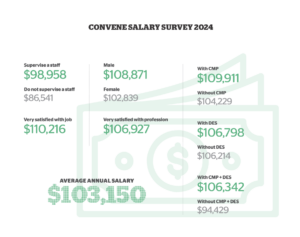Meeting Mentor Magazine
How Does Your Salary Stack up Against Your Peers?
 The good news is that the Professional Convention Management Association’s annual salary shows most meeting pros getting a boost in their wages. But not all jobs are created — or paid — equally.
The good news is that the Professional Convention Management Association’s annual salary shows most meeting pros getting a boost in their wages. But not all jobs are created — or paid — equally.
Are you looking for a new job, or just prepping to ask for a raise? While most of the salary information out there has some relevance for meeting and event professionals, there’s nothing like the granularity of industry-specific salary research to give you the ammo you need to make your pitch.
Now the Professional Convention Management Association (PCMA) has released the findings of its annual salary survey, which analyzed data from 462 event professionals, including average salaries, role, experience, job satisfaction, and more.
Overall, the average 2024 salary of PCMA’s respondents is $103,150, which is up 6% over last year’s average of $97,130. The highest salary reported was a whopping $285,000. Sixty percent believe they’re up for a raise next year, while 21% aren’t so sure their salary is up for increase over the next 12 months. Almost 80% said they did receive a salary increase over the past 12 months.
PCMA also breaks out the data in several different ways, including by job title and organization type.
By title, the top pay goes to executive level/VPs, who pull an average of $116,144. Directors make somewhere in the ballpark of $105,000, while managers reap $84,622 on average and coordinator/specialists earn an average of $64,268. Most of those who responded to the survey were managers (36%) or directors (25%), with the rest comprising executive level/VPs (13%), coordinators (9%) and other (10%).
Of course, those numbers change depending on the type of organization the planner works for — it appears to pay to work on the association side. For example, top pay goes to those who work at nonprofits, who bring in an average of $105,183. The next highest-paying employer type is association, at $101,863, followed by corporations at $89,457 and association management companies at $89,240. Professioinal conference organizers and independent planners tend to make a bit less — $81,600 and $75,000, respectively. Keep in mind that this also reflects the demographics of those who participated in the salary survey, who work mainly for associations (45%). Those who work for corporations comprised 25% of total respondents, while those who work for PCOs were just 9% of the total, with the remainder each making up 5% or less of the respondent base.
What else did the PCMA salary survey discover about today’s meeting professionals? While the vast majority —87% of respondents — were female, men still tended to score a higher average salary: $108,871 versus $102,839, respectively.
They also were a pretty seasoned group. Almost half of the respondents had been in the industry for more than 20 years; respondents as a whole had 18 years of meeting-management experience. As one would expect from the extent of their experience, the average age of respondents was 46. About 40% were 50 or older, while about a third said they were in the 40-to-49-year-old age range. Just 25% said they were younger than 40.
A few more stats from the PCMA salary survey:
• Almost three quarters of respondents are Caucasian (73%); of the remainder, 10% identified as Hispanic or Latino/a, 7% Black and 6% Asian or Pacific Islander.
• Having a Certified Meeting Professional designation — something more than 55% said they had — pays. The average pay for respondents with a CMP was $5,682 more than those who had not yet earned the designation. While a Digital Event Specialist (DES) designation alone didn’t give salaries much of a boost — just over $500, on average — those who had both a CMP and a DES earned $106,342 on average, compared to just $94,429 for those who had neither.
• Forty hour work weeks are not the norm for meeting professionals. Fully three quarters said they put in more than 40 hours a week, with the average being 46. While just 2% said they worked 71-80 hours per week, 19% clocked 51-60 hours. Just a quarter said they worked less than 40 hours per week.
While the hours tend to be long and the pay not the highest, most still said they were satisfied with their jobs (rating an average of seven out of 10), the business events profession in general (eight out of 10), and even their salaries (seven out of 10).
Design by: Loewy Design